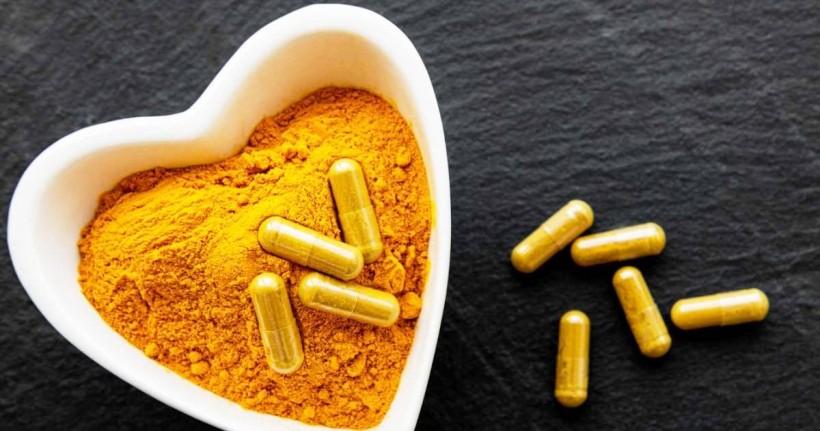Avoid Taking Turmeric Supplements Together With These Medications
Warning: Undefined variable $post in /home/dietofli/public_html/wp-content/plugins/code-snippets/php/snippet-ops.php(584) : eval()'d code on line 3
Warning: Attempt to read property "ID" on null in /home/dietofli/public_html/wp-content/plugins/code-snippets/php/snippet-ops.php(584) : eval()'d code on line 3
The estimated reading time is 7 minutes
Warning: Undefined variable $post in /home/dietofli/public_html/wp-content/plugins/oxygen/component-framework/components/classes/code-block.class.php(115) : eval()'d code on line 3
Warning: Attempt to read property "ID" on null in /home/dietofli/public_html/wp-content/plugins/oxygen/component-framework/components/classes/code-block.class.php(115) : eval()'d code on line 3

Unless you’ve been hiding underground, you are probably familiar with the golden spice that cures many diseases, and it’s as powerful as medicine. You guessed it already, didn’t you? Turmeric is found in almost every dish in India, where people use it daily as a spice, and we assume you’ve already used it at some point. It can help fight many diseases and even reverse them in some cases. Turmeric is both tasty and healthy, and it can surprisingly cure your high cholesterol be beneficial in treating cancer, arthritis, heartburn, or even diabetes. Research has a lot to note on the benefits of consuming turmeric.
Like any other herb, we should be extra cautious when combining it with some medications because it is very powerful. Turmeric’s main ingredient is curcumin, and curcumin is the one that has the power to cure your body but is not well-received by the body when used with certain medications. This article will discuss how to consume turmeric freely and when to be extra cautious, such as when you are on blood-thinning medications. This is so because turmeric acts as a blood thinner, so don’t take any risks if you don’t want to be bleeding more than usual when you are on blood-thinning medications.
Be warned when researching turmeric. Research can indeed be endless. It is unbelievably crazy, but there are even more than 12,500 articles and studies on the health benefits of turmeric (1), and I know you won’t have time to read on those, but the information is just extra helpful. It is number one on the list of research because you can cure many illnesses with this excellent herb. So, what exactly is turmeric? (2)
What Is Turmeric And Why Is It So Good For You?
Curcuma longa plant comes from India and gives us the excellent benefits of turmeric. But, apart from India, we can find it in other Southeast Asian countries, and it comes from the family of gingers. So, how do we exactly get the yellow curcumin that we love to put in our chicken meals? We have to dry the plant’s roots first, and then; it is ground to get the magical spice.
Nutritional Information
*7 grams of turmeric or about 1 tablespoon in powder has the power to change you in these ways:
- 4.4 grams carbohydrates
- 0.5 gram protein
- 0.7 gram fat
- 1.4 grams fiber
- 0.5 milligram manganese (26 percent DV)
- 2.8 milligrams iron (16 percent DV)
- 1.7 milligrams vitamin C (3 percent DV)
- 170 milligrams potassium (5 percent DV)
- 13 milligrams magnesium (3 percent DV)
- 0.1 milligram vitamin B6 (6 percent DV)
- 23.9 calories
Turmeric Is Powerful Medicine, But Also A Blood Thinner
If you are taking medication for blood thinning, you should avoid taking any turmeric supplements. If you are still taking supplements, you are at great risk of getting bruises or bleeding. Moreover, the medicine you are taking won’t be effective. Here is a list of common pills taken as blood-thinners:
- Coumadin (Warfarin)
- Aspirin
- Plavix (Clopidogrel)
- Voltaren, Cataflam and others (Diclofenac)
- Advil, Motrin and others (Ibuprofen)
- Anaprox, Naprosyn and others (Naproxen)
- Lovenox (Enoxaparin)
- Heparin
- Fragmin (Dalteparin)
Does my health condition say I should not take turmeric (curcumin) supplements?
This is a question that many of you have asked yourself. So, the situation is that you have followed the research and read all about the benefits of curcumin and turmeric. However, you have a specific health condition that is taken seriously, so you are not sure whether it is safe to take turmeric in the form of supplementation. Supplementation will not work with the below-listed health conditions that we will describe, supplementation will not work. Therefore, you should avoid turmeric supplements in the following cases:
Gallbladder issues:
As you may be aware, what turmeric does to the body is increase the bile secretion in the body, which will, unfortunately, make this health condition even worse. In addition, turmeric can also worsen bile duct obstruction, cholangitis, or similar biliary illnesses.
Diabetes medications:
Medications that work with lowering blood sugar are also to be taken seriously. In this case, if you are taking turmeric, it will only make the drugs much stronger. In other words, you are at risk of developing low blood sugar or hypoglycemia, so be careful with those medications. (3)
Anemia:
How about if you are suffering from iron deficiency or anemia? Turmeric supplements don’t go along with iron supplements either. Turmeric supplements can stop iron from absorption in the body, so please avoid them at any cause.
Taking turmeric during pregnancy:
Pregnancy is by itself a condition that requires constant observation, but when it comes to turmeric, it is best to be avoided because it stimulates the uterus in a way. Unfortunately, if you are taking any turmeric supplements, you may have a miscarriage.
Bleeding issues:
As mentioned above, turmeric can act as a blood thinner and slows down blood clotting. The critical thing to mention is that turmeric should be avoided even though a person isn’t taking medications such as blood thinners. Moreover, if, in any case, you have an upcoming surgery and you are taking curcumin at the same time, please stop consuming the supplements at least 14 days (2 weeks) in advance.
Stomach Acid Medications
If you are currently taking medications that reduce stomach acid and are thinking about turmeric supplements, be careful because turmeric can worsen increased stomach acid production. Please be cautious because turmeric can seriously interfere with the following medications:
- Famotidine (Pepcid)
- Esomeprazole (Nexium)
- Omeprazole
- Cimetidine (Tagamet)
- Lansoprazole (Prevacid)
- Ranitidine (Zantac)
Daily Intake Of Turmeric
How much is a safe dose?
Turmeric as a spice never hurts anyone, so keep making those delicious meals every day! However, what should concern you is how much you consume in supplements. This is because supplements include a high concentration of turmeric. To make things even more apparent, you should be aware that when taking supplements, you are taking 95% curcumin, whereas when consuming the spice, it is only 3%.
WHO (The World Health Organization) gives recommendations regarding how much you should take so that you don’t exaggerate. Related to your weight, don’t take more than 1.4 milligrams per pound (0-3 mg/kg) of your weight. This is roughly translated into 500 milligrams in a day to make it short.
It’s important to consider that every person is different and has different requirements for vitamins and supplements. Consult your doctor before taking any supplements, especially when considering turmeric and curcumin. The doctor may look at your overall health or any possible health condition and then decide whether you should take the supplement or not. (4)
Side Effects
You can take turmeric daily. It is also safe to take it as a supplement that can cure many diseases over time. Suppose you decide to take turmeric for a short period. In that case, you should be safe without worrying that anything wrong will happen to your body and overall health. A period of 2 months is considered a short period. Apart from taking it as a supplement, you can also apply it to the skin.
Of course, this applies if you don’t have any allergic reactions to curcumin. Moreover, turmeric can safely be used as an enema, too, so you can safely continue using it in this way, and like with any medicine, taking turmeric supplements can cause rare side effects in some cases. These include vomiting, diarrhea, nausea, dizziness, or a stomachache. However, they typically occur when you take very high doses of supplements and are mild, not severe, so don’t stress out.














